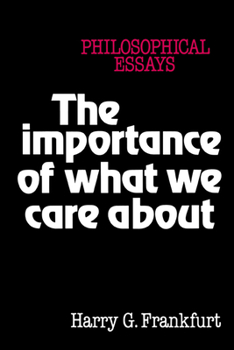The Importance of What We Care about: Philosophical Essays
Select Format
Select Condition 
Book Overview
Este libro reúne trece ensayos seminales sobre ética y filosofía de la mente escritos por uno de los más importantes filósofos norteamericanos contemporáneos. Los trabajos, que se ocupan de problemas... This description may be from another edition of this product.
Format:Paperback
Language:English
ISBN:0521336112
ISBN13:9780521336116
Release Date:September 1988
Publisher:Cambridge University Press
Length:202 Pages
Weight:0.60 lbs.
Dimensions:0.7" x 5.9" x 9.0"
Customer Reviews
3 ratings
Great gift
Published by Thriftbooks.com User , 15 years ago
I ordered this as a gift for a philosophy and book addict...I think it was a good match.
The Answer
Published by Thriftbooks.com User , 18 years ago
This book contains essays about personal ethics -- the decisions we make and what those decisions say about us. The author's conclusions are revealing and complex, and they lead the reader to deeper self-examination. I will re-read this book several times before I surrender it to someone else.
Best short philosophy book of the 1980s
Published by Thriftbooks.com User , 23 years ago
This book collects Frankfurt's most important essays from 1969 - 1988. It begins with "Alternative Possibilities and Moral Responsibility," the most important essay on the conditions of moral responsibility in the second half of the twentieth-century. This essay introduced "Frankfurt-style" counterexamples to the principle that to be responsible for an action (or intention, decision, etc) we must have alternatives to it, or be able to avoid it. Thirty years later, the debate about free will and moral responsibility ignited by Frankfurt's essay continues to dominate the scholarly literature. Frankfurt's reply to Peter van Inwagen in this debate is also included in the book. The second essay, "Freedom of the Will and the Concept of a Person," is even more important: in response to Peter Strawson, it introduced the idea that a person is a being capable of forming "higher-order volitions," and thus capable of taking volitional attitudes towards his/her own motivational states (1st-order desires, emotions, etc). This essay began a series of debates about human autonomy and the structure of the self that continue to dominate that literature in analytic philosophy. Frankfurt develops his idea that we can identify with or alienate our own first-order desires (or subjective reasons for action) in "Three Concepts of Free Action," "Identification and Externality," and "Identification and Wholeheartedness." In the remaining essays, Frankfurt introduces his concept of "caring," which is related to the higher-order will, and begins his argument that our most fully autonomous or unambiguously self-determined motives may be found in cares that involve "volitional necessity" for us, an unwillingness to let alternatives even become available. Thus we see at the end that Frankfurt's 1969 argument concerning the compatibility of responsibility and inevitability is required for his concept of the self, which is defined by its commitments or cares. Although several of these papers require philosophical training the appreciate, the essays on caring and the unthinkable will be interesting to any educated layperson. The book could be used for an advanced undergraduate seminar, and is essential for all graduate students studying moral psychology.





